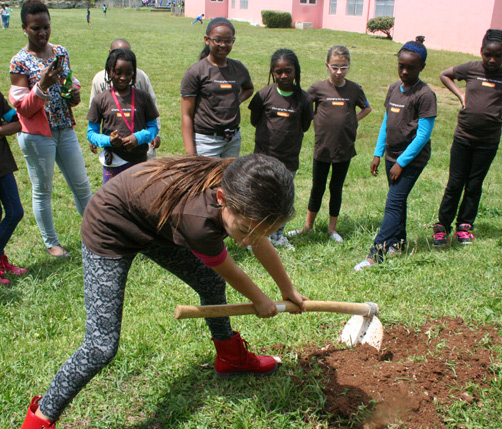Elliot Primary School is one of eight local schools to go green
Elliot Primary School is one of eight Bermuda schools to have joined an exciting new programme aimed at promoting sustainability. The internationally-accredited Eco-Schools programme aims to empower students to change the way they live to better help protect the environment for generations to come. The programme has been de- signed by the Foundation for Environmental Education and is being driven locally by Greenrock. The Bermuda Sun's Sarah Lagan visited the first session of the school's eco club.
As we gathered around a little grassy patch where a new Bermuda cedar tree was to be planted, the members of the Elliot Primary School's eco club were beside themselves with excitement.

When the school grounds -man asked who would like to help dig up the soil where the young tree could be planted, ten little arms shot up into the air and all the children began pleading: "Me! Me! Me!"
It goes to show how proud and excited the young students are about having their own eco club at the school, which has just been introduced by the Foundation for Environmental Education through local charity Greenrock.
Greenrock's Abbie Caldas, who is heading up the Eco-Schools initiative in Bermuda, asked the students why they thought it was important to plant endemic trees on the island and one keen student pointed out that they could only be found here and so we need to protect them.
When Abbie spoke about the harm that invasive plants and animals could have locally, another student told the group how lionfish were harming Bermuda fish populations.
The students, aged between 8- and 10-years-old, were gathering for their first official Eco-School meeting and already they had their ideas about how we should save the environment. They are encouraged to take ownership of the programme and were bursting with ideas about the direction their club should take.
Part of the Eco-Schools' ethos — it is about letting the students take control of their own club while following a few effective guidelines with the help of Abbie and Science teacher Ms Woolridge. Abbie told the Bermuda Sun: "It is important that we do not make it above the students — we make sure they are all involved in it.
 A few girls at one of the schools dropped out and we said, 'Guys, this is like the Olympics — you are representing your country'. They need to feel recognised and excited about it." The Eco Schools programme is made up of seven different steps of sustainability, which begin with the formation of an Eco Schools committee and environmental review of their school.
A few girls at one of the schools dropped out and we said, 'Guys, this is like the Olympics — you are representing your country'. They need to feel recognised and excited about it." The Eco Schools programme is made up of seven different steps of sustainability, which begin with the formation of an Eco Schools committee and environmental review of their school.
The students then create an action plan, which they will monitor and evaluate throughout. The lessons they learn will not be limited to the Eco School members — the scheme is designed to inform all sections of the school community and ends in the creation of an Eco-Code. Each school chooses a certain environmental theme which they will focus on throughout their course.
"It is up to them which theme they choose," explained Abbie. "It could be waste or energy — these guys (at Elliot) are leaning towards school grounds. They love gardening. If they do choose that they have to do an audit. Alison Copeland at Conservation Services will help us to do that and understand what the school grounds are like currently, how we interact with them, what kind of biodiversity we have — and this informs the action plan. For example, we have a few plants but maybe we could get some more shade in the court yard so let's plant a tree.
After they have done the action plan they monitor and evaluate it and assess the rest of the school and engage with the rest of the students. It is a school-wide program me.
"They will hold assemblies to present what they are doing, they will have a bulletin board and they will eventually host an event to inform and involve the wider community including parents, businesses and neighbours." What's more, the work the students carry out in their eco club will directly relate to their official school curriculum.
"I work with the teachers and I have explored the curriculum," said Abbie. "There are aspects that tie in so we have to make lesson plans." The ultimate aim is for the Eco Schools in Bermuda to gain international accreditation through the Foundation for Environmental Education programme. They will eventually earn a green flag that will put them on the global map for sustainable living and advocacy.

